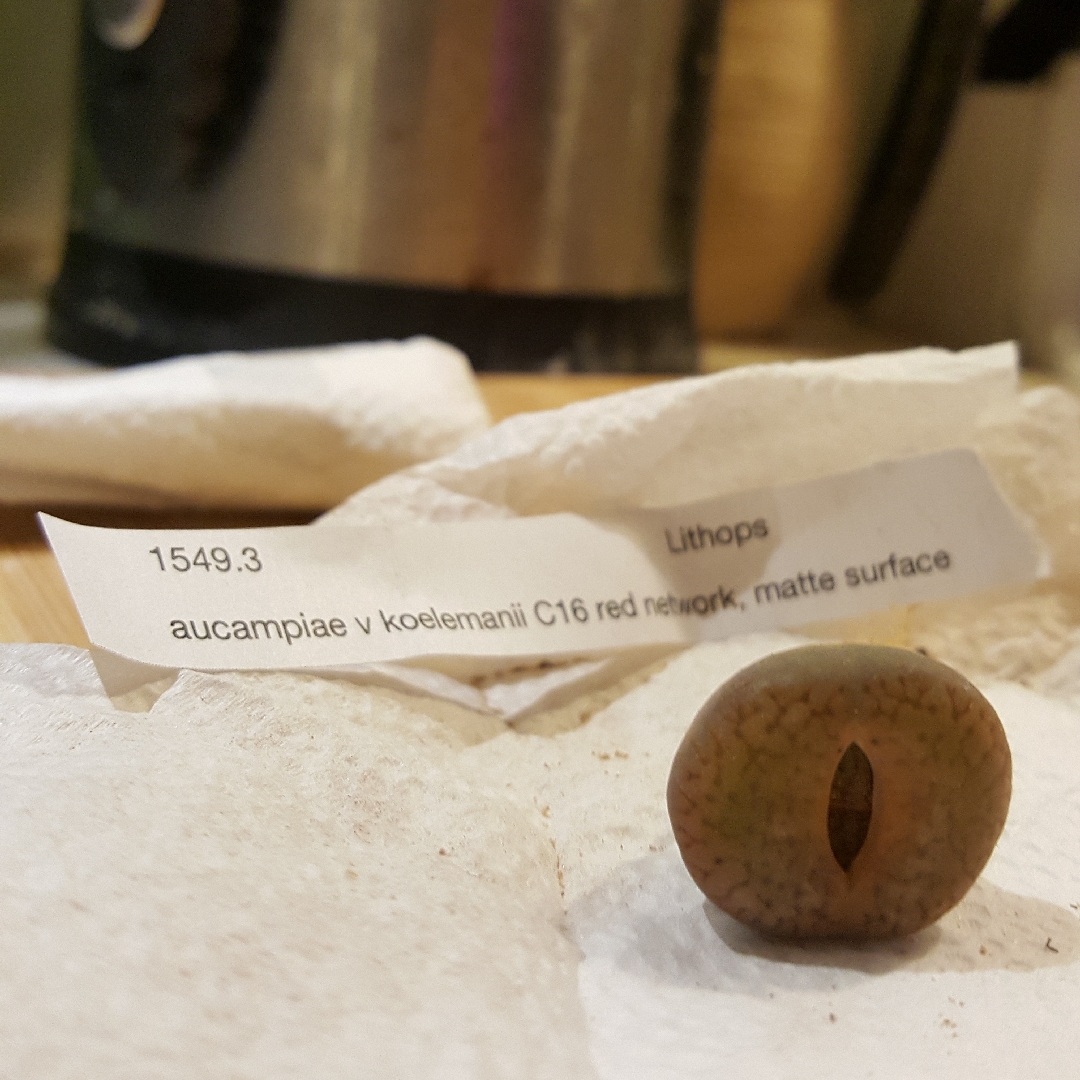
Lithops Aucampiae var. Koelemanii C16
Living Stones 'Aucampiae Koelemanii'
Lithops aucampiae var. koelemanii C016 (collected in the type locality: 35km North-West of Postmasburg, Cape Province, South Africa by Desmond Thorne Cole) is a local or morphological form of the widespread and variable Lithops aucampiae. Lithops aucampiae var. koelemanii differs from the type variety mainly for its usually smaller clumps (two bodies being its usual limit) and for the opacity of its reddish bodies, which have the dull texture and pitting of an old brick. A few specimens have well defined windows, but in most cases windows are not present, giving the entire superior face an uniform, dull and opaque appearance. In particular the plants from C016 collection distinguish for the red network and matte surface. However the distinguishing characteristics of Lithops aucampiae var. koelemanii C016, appear to fall within the natural variation of Lithops aucampiae and it should be synonymized with the latter, but it still has a value for a collector because they identify plants with particular characters. A popular and sought after succulent. Lithops have paired leaves with smooth flat or rounded tops that are ridged or wrinkled, sometimes with transparent windows, and sometimes colorful markings. The flowers are white or yellow and emerge in autumn or winter. Lithops are relatively easy to grow if given sufficient sun and a suitable well-drained soil.
Contributed by @sushiwaitress
-
Full sun to partial shade
-
Very little water
-
Not Frost hardy
-
Light and free draining
Common name
Living Stones 'Aucampiae Koelemanii'
Latin name
Lithops Aucampiae var. Koelemanii C16
type
Succulent
family
Aizoaceae
ph
5.0 - 6.5 Acid - Neutral
Plant & bloom calendar
-
Best time to plant
full grown dimensions
 0.02 M
0.01 M
0.02 M
0.01 M
Lithops Aucampiae var. Koelemanii C16
Lithops aucampiae var. koelemanii C016 (collected in the type locality: 35km North-West of Postmasburg, Cape Province, South Africa by Desmond Thorne Cole) is a local or morphological form of the widespread and variable Lithops aucampiae. Lithops aucampiae var. koelemanii differs from the type variety mainly for its usually smaller clumps (two bodies being its usual limit) and for the opacity of its reddish bodies, which have the dull texture and pitting of an old brick. A few specimens have well defined windows, but in most cases windows are not present, giving the entire superior face an uniform, dull and opaque appearance. In particular the plants from C016 collection distinguish for the red network and matte surface. However the distinguishing characteristics of Lithops aucampiae var. koelemanii C016, appear to fall within the natural variation of Lithops aucampiae and it should be synonymized with the latter, but it still has a value for a collector because they identify plants with particular characters. A popular and sought after succulent. Lithops have paired leaves with smooth flat or rounded tops that are ridged or wrinkled, sometimes with transparent windows, and sometimes colorful markings. The flowers are white or yellow and emerge in autumn or winter. Lithops are relatively easy to grow if given sufficient sun and a suitable well-drained soil.
Planting
From Early Spring TO Early Spring
Lithops thrive best in a coarse, well-drained substrate. Any soil that retains too much water will cause the plants to burst their skins as they over-expand. Plants grown in strong light will develop hard strongly coloured skins which are resistant to damage and rot, although persistent overwatering will still be fatal. Excessive heat will kill potted plants as they cannot cool themselves by transpiration and rely on staying buried in cool soil below the surface.
Propagation
From Early Spring TO Early Spring
Propagation of Lithops is by seed or cuttings. Cuttings can only be used to produce new plants after a plant has naturally divided to form multiple heads, so most propagation is by seed. Lithops can readily be pollinated by hand if two separate clones of a species flower at the same time, and seed will be ripe about 9 months later. Seed is easy to germinate, but the seedlings are small and vulnerable for the first year or two, and will not flower until at least two or three years old.










